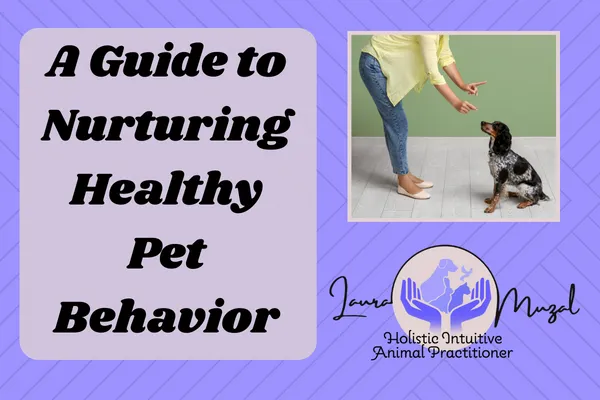Pawsitively Holistic: Your Guide to Pet Wellness

A Guide to Nurturing Healthy Pet Behavior

A Guide to Nurturing Healthy Pet Behavior
Owning a pet is one of life's great joys, but it also comes with responsibilities. Our furry (or feathery or scaly) companions depend on us to provide not just food, water, and shelter, but also the training and care to help them develop good behavior habits. Nurturing healthy pet behavior from an early age sets your animal up for a happy, well-adjusted life and strengthens the bond between you. This guide covers some key areas to focus on when raising a well-behaved pet.
Common Behavior Challenges
Despite our best efforts, pets may face challenges in behavior that can impact their well-being and the harmony of our homes. Some common behavioral challenges include:
Lack of Socialization: Insufficient interaction with other pets can hinder social development, leading to shyness, fear, or aggression in social situations.
Undiagnosed Health Issues: Medical conditions can manifest as behavioral issues, underscoring the importance of regular veterinary check-ups to ensure your pet's physical and mental health.
Family Changes: Events like moving to a new home or the arrival of a new baby can disrupt pets' routines, causing stress and anxiety as they adjust to unfamiliar surroundings or changes in their family dynamic.
Routine Disruptions: Significant changes in daily schedules, such as alterations in feeding times or walking routines, can unsettle pets, emphasizing the need for consistency and stability in their daily lives.
Exercise Deficiency: Inadequate physical and mental stimulation can result in boredom-related behaviors like excessive barking, destructive chewing, or hyperactivity. Lack of exercise can also contribute to obesity and other health issues in pets.
These common reasons for behavioral challenges highlight the importance of recognizing good behavior and addressing underlying issues promptly to ensure a happy and harmonious relationship with your pet.
Understanding Healthy Behavior
Recognizing healthy behavior in pets is essential for fostering a positive relationship and ensuring their overall well-being. Healthy behavior encompasses various aspects, including:
Balanced Affection: They display affection without becoming overly clingy, seeking attention and companionship without being excessively dependent on their owners.
Friendly Disposition: They are amicable towards people, children, and other animals, showing curiosity and friendliness in social interactions.
Comfortable with Handling: They are at ease with regular handling and interactions, allowing for grooming, vet visits, and other necessary care without fear or aggression.
Proper Waste Elimination: Teaching pets to eliminate waste in designated areas promotes cleanliness and hygiene in the home, preventing accidents and unpleasant odors.
Resilience to Fear: They exhibit resilience to normal and new experiences, showing curiosity and confidence rather than excessive fear or anxiety.
Adaptability: They cope well with changes in routine or environment, adjusting easily to new situations and environments without undue stress or anxiety.
Addressing Behavior Challenges
To cultivate healthy behavior in pets, it's crucial to address their fundamental needs and provide appropriate guidance and support. Here are some practical steps to address common behavior challenges:
Exercise and Environmental Enrichment

Ensuring your pet receives enough exercise is crucial for their physical health and mental well-being. For dogs, aim for at least 30 minutes to an hour of moderate to vigorous exercise daily, depending on their breed and age. This could include brisk walks, runs, or engaging in games like fetch or tug-of-war. Cats, on the other hand, benefit from short bursts of intense activity, so try incorporating interactive toys like feather wands or laser pointers into their playtime.

In addition to physical exercise, environmental enrichment plays a vital role in keeping your pet mentally stimulated and engaged. Consider rotating their toys regularly to keep things interesting, providing puzzle feeders or treat-dispensing toys to encourage problem-solving, and creating safe spaces where they can retreat when they need some downtime. You can even set up a "catio" or an enclosed outdoor space for your feline friend to explore safely.
Positive Reinforcement Training
When it comes to training your pet, positive reinforcement is the name of the game. Instead of focusing on what your pet does wrong, reward them generously for the behaviors you want to encourage. Whether it's sitting calmly when guests arrive or using their scratching post instead of your furniture, shower them with praise, treats, or their favorite toy whenever they get it right.
Consistency is key when it comes to positive reinforcement training. Set clear rules and boundaries for your pet, and make sure everyone in the household is on the same page. Remember to be patient and understanding – learning takes time, and your pet will make mistakes along the way. Avoid punishment, as it can lead to fear and anxiety, undermining the trust between you and your furry friend.
Managing Stress and Anxiety
Pets can experience stress and anxiety for a variety of reasons, from thunderstorms and fireworks to changes in their routine or environment. Identifying the triggers for your pet's anxiety is the first step toward helping them cope. Once you know what sets them off, you can take steps to minimize their exposure to stressors or help them develop coping mechanisms.

Creating a safe and comfortable environment for your pet is essential for managing their anxiety. Provide plenty of hiding spots where they can retreat when they feel overwhelmed, and consider using pheromone diffusers or calming sprays to create a soothing atmosphere. Additionally, establishing a consistent daily routine can help reduce uncertainty and provide structure for your pet.
Introducing CBD (cannabidiol) products can also be beneficial in managing your pet's stress and anxiety. CBD has been shown to have calming effects on pets, helping to alleviate symptoms of anxiety and promote relaxation. Whether in the form of treats, oils, or salves, CBD products can offer a natural and safe way to support your pet's emotional well-being.
Potty Training and House Soiling
House training can be a challenging but essential part of pet ownership, particularly for puppies and newly adopted animals. Consistency, patience, and positive reinforcement are key to success. Establish a regular schedule for potty breaks, taking your pet outside first thing in the morning, after meals, and before bedtime, and praise them lavishly when they do their business outside.
If accidents happen indoors, clean up thoroughly with an enzymatic cleaner to remove any traces of odor that might encourage repeat offenses. Avoid punishment, as it can create fear and confusion in your pet, making them less likely to understand what they did wrong. Instead, focus on reinforcing good behavior and preventing accidents through close supervision and crate training when you can't watch them.
For pets that continue to soil indoors despite being fully house trained, there may be underlying medical or behavioral issues at play. Consult with your veterinarian or holistic pet health coach to rule out any health problems and address any underlying anxiety or stress that may be contributing to the behavior.
Socialization
Socialization is a critical aspect of your pet's development, contributing significantly to their behavior and well-being. Early and ongoing exposure to various environments, people, and animals helps your pet become confident, well-adjusted, and friendly. Start early by introducing your pet to new people, animals, and environments in a positive and controlled manner. Gradually expose them to different stimuli, rewarding calm and confident behavior with treats and praise. Supervised playdates with other pets and interactions with friendly, vaccinated animals can also help your pet develop essential social skills. If your pet struggles with socialization, seek guidance from a professional to develop a tailored socialization plan.
Professional Training
Enrolling your pet with a professional trainer can offer invaluable support in addressing behavior challenges. These experts possess a comprehensive understanding of animal behavior and can provide tailored guidance and effective techniques to tackle specific issues. Emphasizing consistency, they play a pivotal role in reinforcing desired behaviors and fostering a harmonious relationship between you and your pet.
Through training sessions, you and your pet will engage in shared learning and teamwork, deepening your bond and paving the way for a well-mannered and delightful companion. Remember, selecting the right trainer aligned with your pet’s individual traits and requirements is crucial for the success of the training program.
A Holistic Approach
In addition to traditional methods, regular energy healing sessions can offer holistic support in addressing behavioral issues in pets. Techniques like energy work or acupuncture help balance your pet's energy flow, promoting relaxation and reducing stress levels. By addressing underlying emotional imbalances, energy healing can help alleviate behavioral issues and foster a harmonious relationship between you and your pet.
Subliminal energy healing videos also serve as a valuable tool for addressing behavioral issues in pets. These videos use calming audio and visual cues paired with subliminal energy healing to promote relaxation, calmness, and positive behavior patterns in animals. While not a substitute for professional training or medical treatment, they complement existing efforts and provide an extra layer of support for your pet's well-being.
Consistency is key when using subliminal energy healing videos with your pet. Incorporate them into your pet's daily routine, playing them during times when your pet is relaxed and receptive, such as during nap time or before bedtime. Monitor your pet's response closely, and be patient – changes in behavior may take time to manifest, so stick with it and maintain consistency in your approach.
Final Thoughts
By establishing a strong foundation of structure, enrichment, and positive reinforcement training, you can nurture your pet's well-being and foster a deep bond that lasts a lifetime. While it requires dedication and effort, the rewards of companionship with a beloved pet make every moment worthwhile.
If you ever have concerns about your pet's behavior or overall health, seeking guidance from a professional is essential. With their personalized advice and support, along with consistent training, attentive care, and a focus on your pet's unique needs, you can ensure they live a happy, healthy, and fulfilling life as a cherished member of your family.
Additional Resources:
Calm Your Pet's Destructive Behavior: Subliminal Energy Healing for a Peaceful Companion
8 Hour Pet Meditation to Prevent Furniture Scratching - Subliminal Messages for Calm Behavior
Prevent Your Pet from Peeing Inside with This Powerful Subliminal 8 Hour Meditation
7 Tips for Supporting Dogs with Anxiety
Have More Questions or Need Personalized Pet Care Advice?
If you have additional questions or need personalized guidance for your beloved pet, I'm here to help. Book a call with me, and let's discuss how to best care for your furry friend. Your pet's well-being is my priority, and I'm dedicated to providing the support and expertise you need. Click here to schedule your consultation today. Together, we can ensure your pet leads a happy, healthy life.
Affiliate Disclosure: Some of the links on this blog are affiliate links. If you make a purchase through these links, the blog owner may earn a commission at no extra cost to you.

